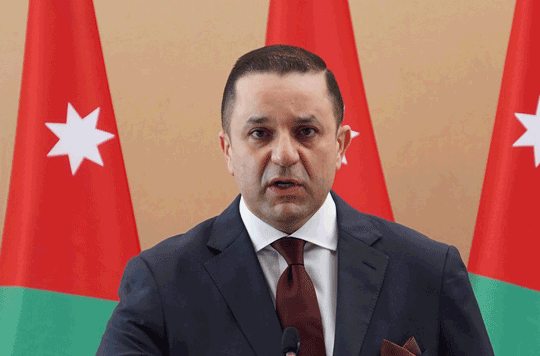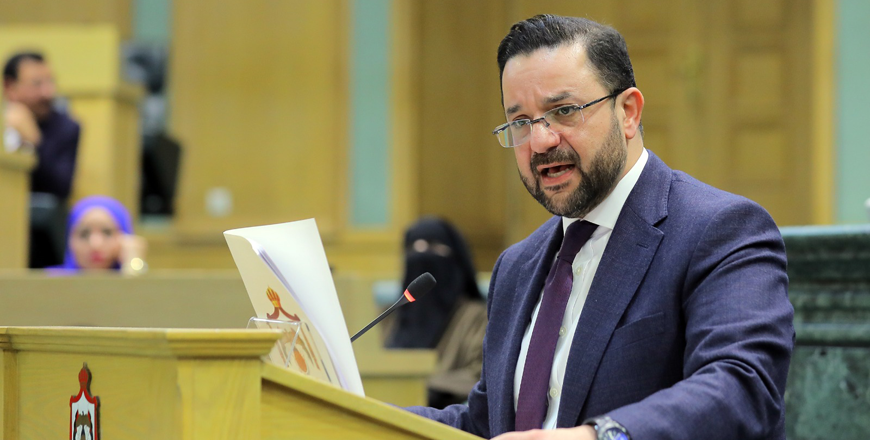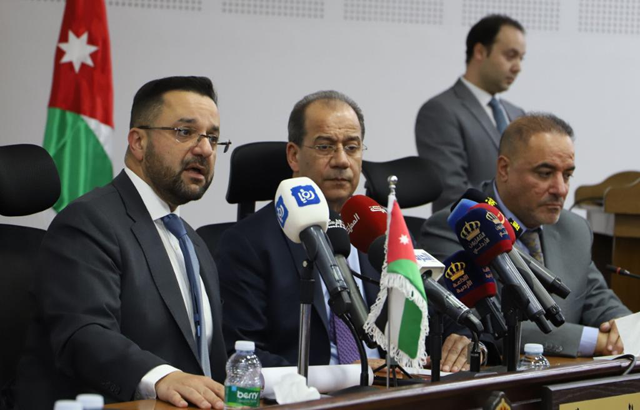You are here
National economy to grow 2.7 per cent in 2023 — Finance minister
By JT - Jan 09,2023 - Last updated at Jan 09,2023

Mohamad Al-Ississ
AMMAN — Jordan's GDP is projected to grow by 2.7 per cent, as inflation is expected to narrow to 3.8 per cent in 2023, Finance Minister Mohamad Al-Ississ said on Monday.
Delivering a speech reviewing the draft budget for 2023 during a Lower House session, the minister said that this year's budget is estimated at JD11.431 billion.
Jordan is one of the few countries that international institutions expect to maintain a trajectory of improved economic performance, the minister said.
Al-Ississ said that the budget projects general revenues to total around JD9.569 billion, including domestic revenues of JD8.767 billion and foreign grants of JD802 million.
He noted that budgetary estimates set public expenditures at JD9.839 billion, current expenditures at JD1.591 billion and capital expenditures at JD1.862 billion, the Jordan News Agency, Petra, reported.
The minister noted that despite all challenges, current economic indicators suggest that the Kingdom’s economy is moving "confidently" along the path of gradual recovery.
Net foreign direct investment (FDI) inflows in the first three quarters of 2022 increased by 94 per cent compared with the corresponding period of 2021, reaching around JD629 million, despite regional and global economic instability, the minister added.
He added that the Central Bank of Jordan's foreign reserves stood at $17.300 billion at the end of 2022. Al-Ississ remarked that this total is "convenient", and reflects the strength of the Jordanian dinar, noting that the current total can cover 7.5 months of the Kingdom's imports of goods and services.
Al-Ississ said that inflation projections increased to 8 per cent in 2022, up from 4.7 per cent in 2021. Recently, Managing Director and Chairwoman of the International Monetary Fund (IMF) Kristalina Georgieva voiced the institution’s anticipation that 2023 will be more difficult than 2022, the minister added.
Addressing the MPs, Al-Ississ remarked that the international arena is still characterised by volatility and uncertainty.
When indications of economic recovery and hopes of a breakthrough after the COVID-19 pandemic started to surface in the international economy, policy makers in influential countries took stringent measures to curb inflation, which had reached unprecedented levels in those countries, the minister noted.
Such procedures had a significant negative impact on developing countries, including Jordan, which prompted international institutions like the IMF to decrease their global economic growth forecast to 3.2 per cent in 2022, compared with 6 per cent in 2021, Al-Ississ said.
The “extraordinary” growth of national exports was the real driver of economic growth, mainly driven by high prices of phosphate and potash.
If phosphate and potash exports are excluded from the calculations, the national export growth rate sits at approximately 26 per cent, which in itself is “an unprecedented success” for other sectors, the minister said.
Accounting for investment outflows, Jordan still enjoys a net positive investment inflow, as incoming investments transcend outgoing investments, according to Al-Ississ.
Other economic successes for the Kingdom include the tourism sector’s “strong” growth, which exceeded governmental expectations for the industry.
The IMF estimates that inflation in Tunisia, Egypt, Lebanon, Turkey, the US, the UK and the European Union will exceed 8 per cent in 2022, while Jordan’s inflation is expected to reach 4.2 per cent in 2022 and 3.8 per cent in 2023, the minister noted, adding that this reflects the government’s success in curbing inflation.
The unemployment rate fell by about 1.5 per cent during the first three quarters of 2022 when compared with the same period in 2021, reaching 22.8 per cent. Despite the drop, the unemployment rate remains high, the minister said.
This government has managed to procure expected income tax revenues, and exceed targets by approximately JD61 million in spite of the fact that 2022 marked the third consecutive year that the government made a commitment to not raise existing taxes or impose any new taxes or fees, Al-Ississ noted.
Income tax revenue amounted to some JD1.350 billion in 2022, 14.4 per cent higher than in 2021. General sales tax revenue amounted to approximately JD4.200 billion, up by 4 per cent compared with 2021, he added.
The government also reduced public debt as a proportion of GDP after excluding debt held by the Social Security Investment Fund.
At the end of 2022, debt to GDP ratio reached 89.7 per cent, compared with 91.9 per cent at the end of 2021. This figure is projected to drop to 88.2 per cent in 2023, according to the minister.
The economic data indicates a rise in domestic revenue coverage for current expenditures, which increased to 87.5 per cent coverage in 2022, compared with 84 per cent in 2021.
This number is expected to reach 89.1 per cent coverage in 2023, and gradually rise to approximately 91.8 per cent coverage in 2025, Al-Ississ said.
Related Articles
AMMAN — The Senate on Tuesday endorsed the 2023 draft state budget as referred from the Lower House.Senators also approved 64 recommendation
AMMAN — The Lower House on Wednesday endorsed the 2023 state budget bill.During a session chaired by Lower House Speaker Ahmad Safadi, in th
AMMAN — The draft general budget for 2023 stands at JD11.432 billion, increasing by 8.3 per cent from 2022, Finance Minister Mohamad Al-Issi


















